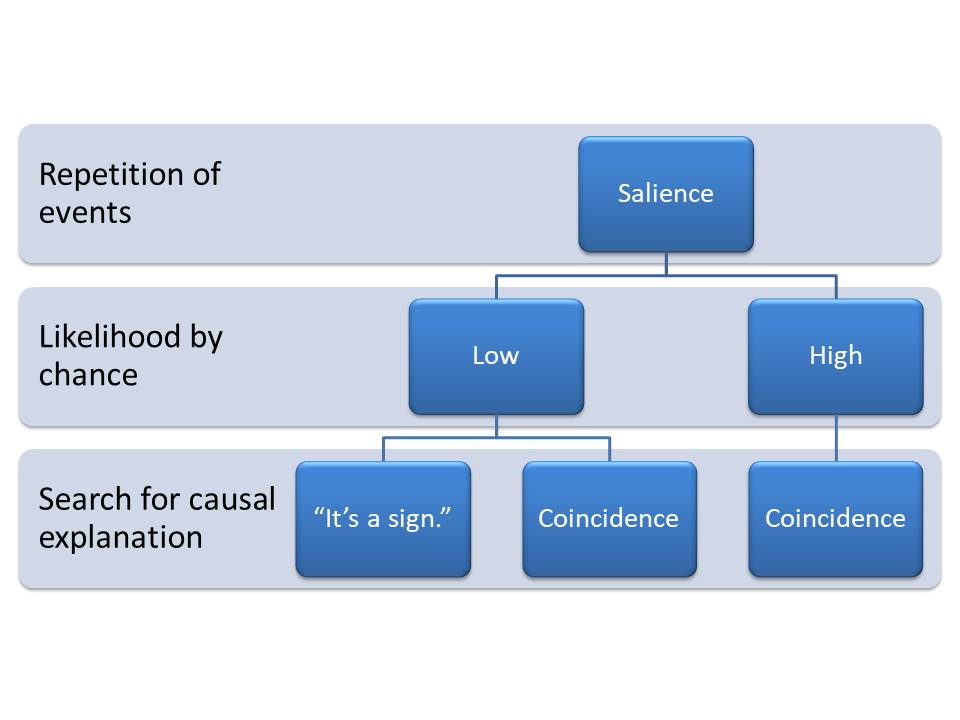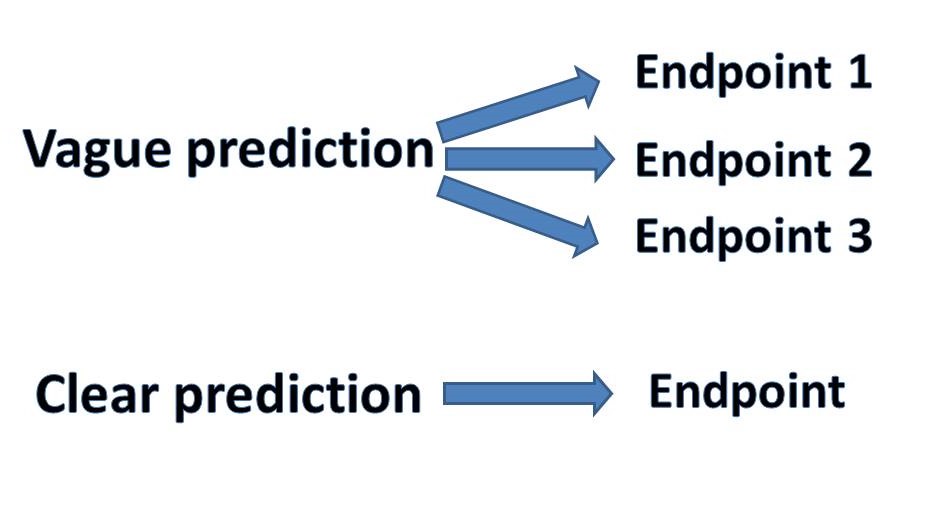You’ve probably come across one of those people who believe they receive signs from the universe. Maybe you’re one of them. I certainly have thought this way in the past.
You know, you’re working on a difficult task and you face an obstacle. Then you tell yourself it’s a sign from the universe that you should quit. Or when you’re thinking about investing in a business and come across a friend who says he has already invested in the same business.

“Boom! That’s a sign I’m on the right path. What are the odds that my dearest friend has invested in the same business I wanted to invest in? We’re telepathically connected.”
Not so fast.
In this article, we’ll explore why we have this tendency to believe we get messages from the universe and why we’re wired to pay attention to these “signs”.
Seeing signs from the universe
Other such instances include:
- Thinking about a friend you haven’t thought about in a while and then receiving a text or a call from them.
- Ordering a pizza for $10 and finding out that you have exactly $10 in your pocket.
- Seeing the number 1111 or 2222 or 333 on number plates.
- Noticing the car you’ve been thinking about buying everywhere.
- Reading a word in a book and then finding the exact same word in your social media feed.
Many have used these examples to justify the existence of the law of attraction, i.e. we attract in our reality what we think about. I’ve written an entire article debunking the law if you’re interested.
Okay, so what’s happening here?
Why are these events so special that people made up a law to explain them? When such events occur, why do people believe they’re signs from the universe?
The need for reassurance and comfort
If you look at the sort of meanings people ascribe to such events, the first thing you notice is that they’re trying to make these events personally relevant. These events have to do something about them. The universe is sending them messages.
Then, if we ask ourselves what purpose these messages serve, almost always the answer is they serve to reassure the receiver. They instill a sense of comfort or hope in the receiver.
Why would a receiver want to be reassured? And why by the universe, of all things?
While going through life, people face a lot of uncertainty- uncertainty in their careers, relationships, future and what not. This uncertainty leads to a loss of a sense of control. But people want to believe they can control their lives and destiny somehow.
Enter the universe.
The universe or energy or whatever is seen as this giant omniscient and omnipotent entity that can guide people and make everything better. It has more control over people’s lives and reality than they do. So they listen to its signs and wisdom.
In this way, people ascribe agency to the universe. The universe is an active agent sending them messages to guide them. (Also see Is karma real?)
Therefore, when people face a difficult or uncertain time and want reassurance that everything will be okay, they satisfy these needs from the universe.
For example, a person who starts a new business takes a risk. They can’t really be sure of success. In the depths of uncertainty, they crave for a “sign” from the all-powerful universe so they can ease their anxiety.
The “sign” provides reassurance and comfort. It could be anything, as long as the person is willing to see it as a sign. Usually, they’re coincidences.
Making important life decisions can be a very difficult and anxiety-laden process. The universe chimes in and eases people’s decision-making.
Everything happens for a reason
When we’re trying to make a tough decision, it helps to shift some responsibility from our shoulders to the shoulders of fate, destiny, or the universe. It’s a defense mechanism that protects the self from the potential negative consequences of a hard decision.
After all, if it’s the universe that gave you the “go ahead” sign, you don’t look as bad after making a poor decision.
People may blame you but not the universe. So you subtly shift the blame to the universe. The universe is wise. The universe must have other plans for you. Everything happens for a reason. It’s the universe that’s more responsible for this than you are.
Of course, wanting to believe that everything happens for a reason also plays into our need for reassurance.
What’s funny is when people really want to do something- when they’ve no doubts about their decisions whatsoever- they seem to throw away the wisdom of the universe. They seem to be less attuned to read the universe’s signs during these moments.
Any time you persist in the face of obstacles, aren’t you ignoring the universe’s signs (obstacles) that you shouldn’t be doing it?
People seem to read the universe’s signs only under uncertainty and when it suits them, satisfying their need for reassurance.
When you face an obstacle and say, “The universe doesn’t want me to do this”, it’s you who doesn’t want to do it at some deep level. Why drag the poor universe into this? You’re just protecting yourself from making a potentially bad decision (quitting).
You’re justifying your life decisions using the crutch of the universe. People have a strong need to justify their life decisions.
Believing that everything happens for a reason again helps them comfort themselves. They want to believe how they’ve turned out is the best way they could’ve possibly turned out.
Sure, it’s comforting, but it’s also irrational. You have no way to know how you might have turned out. Had you made a different decision 5 or 10 years ago, you might have been better off or worse off or even the same. You really have no way to know.
What’s so special about coincidences?
Now, let’s look at these so-called signs and try to figure out what makes them so special compared to other events. As mentioned earlier, most of these signs are really coincidences. But people seem to have a hard time believing they’re merely coincidences.
“Can’t be just a coincidence”, they utter in disbelief.
Ascribing personal, greater meaning to coincidences results from the following three factors:
1. Noticing salience
We’re wired to notice salience in our environments because it invokes a search for causal explanations. Causal explanations, in turn, help us learn.
In simple words, we notice things in our environment that stand out from the noise because they present a learning opportunity.
Say an animal goes to a river every day to drink water. Over time, the animal expects certain things in this context- the flowing river, presence of other animals, and other regularities in the environment.
One day, while the animal is drinking the water, a crocodile leaps from the river to attack it. The animal is surprised and springs back. This event was a salient event that had a low probability of occurrence, at least in the mind of that animal.
So, the animal ascribes intent to the crocodile (“The crocodile wants to kill me”) and learns that it’s dangerous to come here to drink water. The animal might even avoid the river in the future.
All animals respond in some way to such salience in their environment. Charge into a field where a bunch of cows are grazing peacefully and you’ll rattle them. Tap your feet hard on the floor and you scare that mouse.
These are low probability, salient events that present an opportunity for these animals to learn how their environment works. Humans function in the same manner.
“What has all this to do with coincidences?” you ask.
Well, we’re similarly rattled by salient events. Most events you encounter in your daily life are high probability, non-salient events. Were you to see a flying dog one day, you’d be surprised and tell everyone about it- a low probability, salient event.
The point is: When we encounter such low probability, salient events, our minds look for explanations behind such events.
“Why was the dog flying?”
“Was I hallucinating?”
“Was it a large bat?”
Researchers have proposed a framework that highlights the stages in the detection of a coincidence.1
They point out that not only is the detection of a pattern important in experiencing coincidences, but the repetition of that pattern also matters. Repetition essentially makes a non-salient event salient.
Hearing a knock on your door when you’re about to sleep may not be salient enough for you. You can easily dismiss it. But if the same thing happens the next night, that makes the whole thing salient. It demands a causal explanation.
Similarly, when two or more low probability events occur together, the probability of their co-occurrence becomes even lower.
An event A by itself may have a low probability. So what? Not really a big deal and easily dismissible as a coincidence.
Now, consider another event B, which also has a low probability. The probability of A and B happening together is even lower, and it blows your mind.
“That can’t be a coincidence. I was humming a song in the morning and the same song was playing on the radio on my way to work.”
Such coincidences are surprising, and we tend to forget that very low probability is still some probability. You should expect such things to happen, albeit rarely. And that’s what happens.
The framework of experiencing a coincidence comprises the following steps:
- Repetition of two or more similar events/patterns.
- Likelihood of their co-occurrence by chance.
- Search for a causal explanation.

If the likelihood of two events happening together is high, we conclude it’s a coincidence and are not surprised. For example, an alarm buzzing (event A) and you waking up in the morning (event B).
If the likelihood is low, we search for a causal explanation. For example, you thinking of a friend (event A) who then calls immediately (event B). Many people conclude that “it’s a sign from the universe” because no other explanation seems to fit.
The “It happened by chance” explanation seems unlikely as well, even if it’s the most accurate explanation.
People badly need to find an explanation and can’t seem to settle on “It happened by chance”. So they resort to the “It’s a sign” explanation- an explanation that is even more implausible than believing that “It happened by chance”.
The more rational among us, who are content with the “It happened by chance” explanation, do appreciate the low probability of the whole scenario.
They’re somewhat surprised too, having witnessed an event that had a very low chance of happening. But they resist the temptation to resort to implausible explanations.
2. Ascribing intent
Believing that the universe sends you signs implies the universe is intentional. How can the universe be intentional? Universe is not an organism. Organisms are intentional and that too only some of them.
Where does our tendency to ascribe intent to things without intent come from?
Again, this goes back to how we learn.
The environments in which our learning systems evolved placed an emphasis on intent. We had to figure out the intent of our predators and fellow humans. Our ancestors who had this ability to figure out intent out-reproduced those that didn’t.
In other words, our learning systems are designed to figure out intent. If a human ancestor heard a twig breaking in the forest, assuming it was a predator who wanted to attack had greater survival benefits than assuming it was some random twig that broke by chance.2
As a result, we’re biologically prepared to ascribe intent to events having no obvious explanations, and we tend to make them about us.
3. Beliefs and perceptions
When we learn something, we form a belief about something. Beliefs can alter our perceptions in that we seek information that confirms our pre-existing beliefs. And we avoid information that disconfirms them.
People who believe that the universe sends them messages will go to great lengths to interpret events as signs.
For instance, their predictions will have multiple endpoints, i.e. they’ll fit multiple events into their predictions to prove that their predictions are true.3
In our locality, many people believe that when birds chirp intensely, it’s a sign that guests will be arriving. Funny, I know.
It isn’t specified in the superstition when, how, or which guests will arrive. Superstitions tend to be vague like this. This allows superstitious people to fit a range of events into their predictions.
One endpoint or possibility is that the guests arrive immediately after the chirping. Prediction confirmed. Second possibility is that the guests arrive hours later. Prediction confirmed.
Third possibility is that the guests arrive days later. So what? They still arrived, didn’t they? Prediction confirmed.
Fourth possibility is someone calls. That’s the same thing as meeting a guest, just not in person, they argue. Prediction confirmed. You see where I’m going with this.

We fit ambiguous information according to our own perceptions. Once our perceptions are tuned in a particular way, we see reality through their filters.
First, the salience of an event exploits our attentional bias, and we notice it. It lingers in our mind, and then we become attuned to notice it in our environment. Then we connect the two events in our minds are surprised by their repetitiveness.
Memory has a key role to play here. We remember salient events. We pay no attention to instances when these events don’t occur.
Say you’ve been thinking of buying a car and then see that car everywhere over the course of a week. During that week, you may have seen that car, say, seven times.
You remember these salient events vividly. During the same week, you also saw many other cars. In fact, you saw more such cars than the one you were thinking of purchasing.
Your mind paid little attention to these many other cars because your perception was fine-tuned to notice the car you were thinking about.
This isn’t a sign from the universe that you should purchase that car. It’s just how our mind works.
The best way to make important decisions is not to rely on superstitions like these, but to weigh all the costs and benefits of these decisions appropriately.
References
- Johansen, M. K., & Osman, M. (2015). Coincidences: A fundamental consequence of rational cognition. New Ideas in Psychology, 39, 34-44.
- Beck, J., & Forstmeier, W. (2007). Superstition and belief as inevitable by-products of an adaptive learning strategy. Human Nature, 18(1), 35-46.
- Watt, C. (1990). Psychology and coincidences. European Journal of Parapsychology, 8, 66-84.
